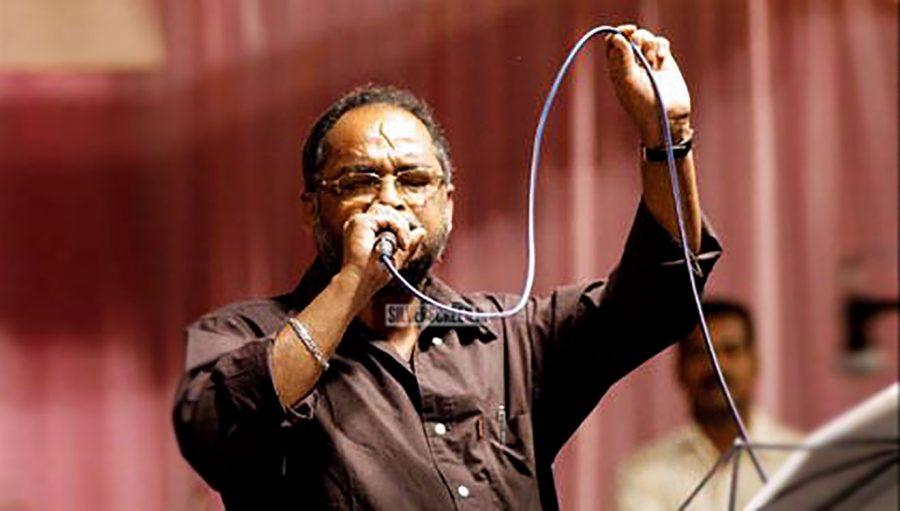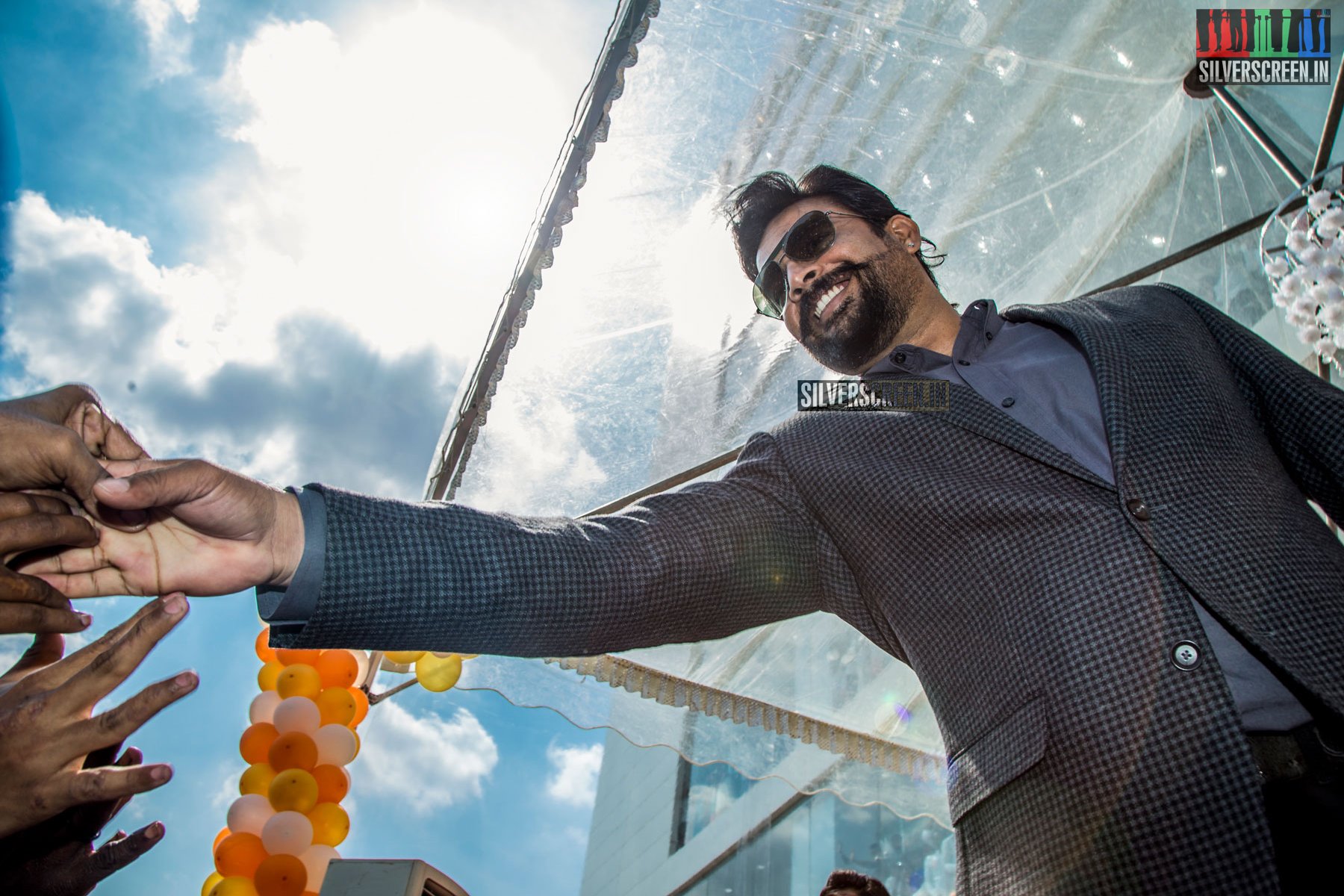“How can I not be hopelessly romantic?” Johnson Master is known to have asked a journalist who sought to know the secret behind his music. “It is important for an artist to be a romantic,” he said, “how else will I make music?”
Today marks the fifth death anniversary of Johnson Thattil, popularly known as ‘Johnson Master’, a two-time National Award-winning composer. He died on 18 August, 2011 in his residence in Chennai. Regarded as one of the most brilliant composers Malayalam cinema has ever had, Johnson won the Kerala State Film Awards five times during his career spanning over three decades.
The testaments to his ‘romantic’ relationship with his music, are several: the enigmatic reel-to-reel soundtrack in Thoovanathumbikal that flow out of the screen every time Sumalatha’s Clara makes an appearance; the beautiful theme music that sets the ambience for the uninhibited romance of Solomon and Sophie in Namukku Parkkan Munthiri Thoppukal; the song of love, longing and despair – Rajahamsame – that lifted a nondescript love-story, Chamayam, to a higher level.
“His songs were special. They might sound like simple light music at first. But they are so intrinsically composed. To bring those details into the singing is really difficult,” says G Venugopal, a singer who sang many of Johnson’s compositions, “he had a great grasp of the lyrics, a trait not many composers have. He understood literature like music. Take any of his songs – the lyrics have their soul intact.”
*****
Born to Antony Thattil and Mariyamma on 26 March, 1953 in Nellikkunnu, Thrissur, Johnson’s journey into the music world began from the altar of his parish church, as a member of the church choir. Guitarist Atlee D’cunha, a close friend of the musician, remembers him as a young boy who would ask him for a ride on the bicycle to the music club in Thrissur town.
“Johnson would come and watch us practice. Later he joined our team as a ‘female voice’ singer. He was 12 years old then, so his voice matched”, says Atlee. He and some of his college friends had formed a music troupe called The Voice of Thrichur. “Johnson was promoted to the role of music conductor of the orchestra. That’s where he learned to play all the musical instruments,” Atlee reminisces.
A lover of western music, Johnson grew up listening to a lot of Cliff Richards and Tom Jones. He was not a trained musician. “In his free time, he would come to the club and practice the harmonium, tabla, guitar, and violin. He was self-taught. A brilliant prodigy,” says Atlee, who is one of the founders of the Music Director Johnson Foundation, a non-profit organisation in memory of the composer. Composer Ouseppachan, directors Sathyan Anthikkad, and Kamal are also closely associated with the foundation which conducts musical evenings every year in remembrance of the unparalleled musician.
In his early stage shows, Johnson handled many roles seamlessly. He would conduct a music performance and would, in between, rush to play the guitar or the violin for a particular portion, then come back and resume conducting. Although Johnson used to play all the instruments with equal expertise, Atlee feels that he was an outstanding violinist. “Violin was his forte. In his songs, he used keyboards and guitar a lot, but if you listen to the violin segments he has done, you would know that he was a genius,” he says.
In the late 1960s and early 70s, the music troupe had a busy time. They were one of the most sought-after musical troupes in Kerala. National Award-winning composer, Ouseppachan was a member of this team, and singers like Jayachandran and Madhuri performed in their musical shows. It was Jayachandran who introduced Johnson to veteran composer G Devarajan.
In his early twenties, Johnson joined the team of maestro Devarajan Master as his assistant. He moved to Chennai which would become his home henceforth. “Johnson had lived all his life in Thrissur. The school and the church gave him scholarships to study and he was a bright student. Sometime after he moved to Chennai, his sister passed away. Her death affected him deeply. His visits to the family house in Thrissur became less frequent from then,” says Atlee.
Johnson was one of Devarajan Master’s favourite assistants. The revered composer would often praise Johnson for his unorthodox style of music, and love for literature.
*****
The first film that Johnson composed music for was Bharathan’s Aaravam, in which he worked with Ouseppachan, a close friend, and a long-time colleague. Although many assumed that the duo would continue to work together like Laxmikant – Pyarelal, they parted ways and became independent music composers. The friendship, nevertheless, remained intact.
Johnson’s music was pure and uncompromising. A perfectionist, he was careful to not repeat himself or be influenced by other musicians. “He wouldn’t listen to songs. Not even his songs. He was afraid that it might influence his later songs. He was careful not to be repetitive,” says Atlee.
Writer and head of the Music Research wing of Mathrubhumi, Ravi Menon recalls an incident during the composing sessions for Naseema, one of Johnson’s early works. “Renowned poet P Bhaskaran was the lyricist for the movie. Johnson was thrilled to work with him. The lyrics of one of the songs began like this, “ennittum neeyenne arinjillallo…” (yet, you didn’t know me). It was unusual to begin a song that way, with an abrupt line. Johnson took it as a challenge. It took him one whole week to arrive at that perfect tune for the first line.”
Ennittum is a quintessential Johnson song – a lovely melody with a touch of Hindustani music. A lover’s lament, it takes off like a continuation of a story already told. Could that first line have been any better than what it is now? Possibly not.
Singer G Venugopal was one of Johnson’s favourite collaborators. He remembers Johnson as a “real composer who, unlike many of his contemporaries, didn’t limit himself to ‘tune making’”. “He would sit with a harmonium and compose every song and background score. He did the orchestra arrangements by himself. He was one of the few composers who could do all aspects of film music with mastery,” says Venugopal.
Johnson’s theme music pieces are as famous as his songs. His work in Thakara was regarded as the first leitmotif in Malayalam cinema. He composed them minimally, with few instruments. His most notable background music works were in films like Chaatta, Oridathoru Phayalvan, Namukku Parkkan Munthirithoppukal, Thoovanathumbikal and Njan Gandharvan.
Watch: Johnson Talks About Composing Background Scores (Courtesy: Amrita TV)
“Johnson didn’t base his songs on a particular keerthana or a specific raga. I would say most of his compositions had a shade of Hindustani than the Carnatic style of music. And he was not trained in either of the styles,” says Venugopal. Johnson loved the old-fashioned way of recording songs live, in a studio with orchestra and singers. “He continued this style even when the industry started shifting to modern technologies”, he says.
One of Johnson’s most distinct works is Bharathan’s Chamayam (1993). The cheerful rustic number, Anthikkadappurathu, was very different from Johnson’s usual style. The song that began at a slow pace, gradually gathers momentum and ends on a high-spirited note. Shot in and around a local toddy bar on a seashore, the song’s visuals featured actors Murali and Manoj K Jayan.
“I first listened to Anthikkadappurathu one evening, when Murali and I were relaxing on the seashore after the day’s shoot. I was awe-struck by the song’s energy. It revealed a totally different side of Johnson Master that we had not seen before”, says Manoj K Jayan. The actor, a singer himself, continues to sing and perform Anthikkadappurathu on stages in and outside the country. “It is still a highly popular song. People have never got tired of it”, he says.
The best of Johnson’s works came out in the 1990s. Director Fazil’s Manathe Vellitheru was a super-hit album. The songs he composed for the movie had a touch of pop, much ahead of the times. But it was Kireedam (1989) that Johnson considered as his most outstanding work. In an interview with Mathrubhumi, the composer said that watching the song Kanneer Poovinte on screen was a rare emotional experience.
*****
The life of a music composer in the film industry is never easy. When he was at the peak of his career, Johnson was working 24 hours every day to meet deadlines. The work took a toll on his health.
In the late 1990s, Johnson Master had an accident. He fell off a moving train near Thiruvananthapuram. The mishap affected the functioning of his nerves. He stopped attending phone calls, distanced himself from the world. Slowly, he vanished from the industry.
“Once, during that period, he broke down before me. He said the people, whom he trusted so much, had betrayed him. Perhaps that was a side-effect of the medicines he had been taking”, says Atlee.
According to Johnson’s close friends, in spite of the great music that he made, the industry was not honest with him. A number of cheques he had received as payment from producers and studios, had bounced.
Venugopal remembers Johnson Master as a noble human being who would fight with producers and studios if a singer or one of the performers in his orchestra was not paid on time. “He was kind and honest. He didn’t have any self-marketing skills. Even when the industry moved past him, he didn’t forgo his old-fashioned, pure music,” says Venugopal.
Many times in the early 2000s, Johnson tried to make a comeback to cinema, but in vain. “He wanted to work but was not offered any. It deeply hurt him that some of the directors, with whom he had made many unforgettable songs in the past, chose new composers over him. Some of them had even stopped taking his calls,” says Ravi Menon.
Finally, in 2006, he returned to mainstream films with Ranjan Pramod’s Photographer. The song, Enthe Kannanu Karuppu Niram fetched him numerous awards that year. This was followed by Jayaraj’s Gulmohar in 2008 which won him the Kerala State Film Critics Award.
*****
Johnson had a close-knit family. “He, his wife Rani, and kids Renn and Shan – they were very close to each other. They took great care of him after the accident,” says Atlee.
In an interview with TV New in 2015, his daughter, Shan shared her childhood memories of being around her father. “Even during his busiest time, daddy made sure that we did not miss his presence. He was always around. He would call from work; sometimes, he would take me to the recording studio. After composing a song, he would make us listen to the track or the master copy. He let us be a part of everything,” she said.
A year after Johnson’s death, on February 26, 2012, his 23-year-old son Renn Johnson died in a bike accident. After this incident, Shan turned to music for consolation. “When daddy was around, I never thought of making a career in the music field. After he and Renn left, I felt an emptiness which could be filled only with music,” she said in an interview.
Recommended
A promising musician, Shan was part of a band called Sound Bulb that she founded with a few friends. She started her career as a composer with a devotional album produced by Jino Kunnumpurathu. She then wrote the lyrics for Vettah, a 2016 movie directed by late Rajesh Pillai. It was while she was working on her first Malayalam feature film as a composer, that tragedy struck again. In February 2016, Shan was found dead in her apartment in Chennai. She was under medication, had suffered a massive heart attack.
“On the morning of her death, she was supposed to come to Thiruvananthapuram to record my portion of a song. The other portion, sung by Sujatha, had already been recorded. I dialed her number that morning to check where she had reached, and couldn’t get through. Later, I came to know that she was lying dead at that time. A great talent, cut down in the prime of life,” says Venugopal.
*****
During the last few years of his life, Johnson was seen as a judge on a television reality show named after singer Yesudas. For people who knew him closely, it was apparent that he never warmed up to the television cameras. He rarely smiled or got animated. But whenever a contestant performed a song he loved, he would pull out his guitar and play along. He was rarely seen without a guitar in his hand. “That wasn’t any gimmick. He was inseparable from his music,” says Atlee, who has seen Johnson in his best and worst times. “He was a good man,” reminiscences the old friend who is yet to come to terms with the cruel fate that befell the Johnson family.
Atlee and Ouseppachan are now busy organising a music competition under the banner of Johnson Foundation to discover and honour fresh talents in the field of music. The primary round of the competition will be held on 21 August and the final rounds will happen in September, in a grand musical evening attended by celebrities from the film industry.
“The industry has changed a lot from what it was when Johnson started out. Now, singers hardly get paid and music directors are too dependent on technology”, says Ravi Menon, “In and around the black and white era, music directors were the most revered in cinema. One had to be extremely talented to be a music composer. Now, it’s all about playing with auto-tuners. Composers, most of them, make synthetic music. Would Johnson, a man whose music was so raw, have survived this era, if he were alive? I am not sure.”
*****



